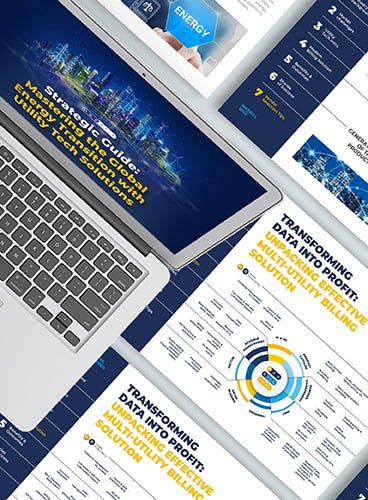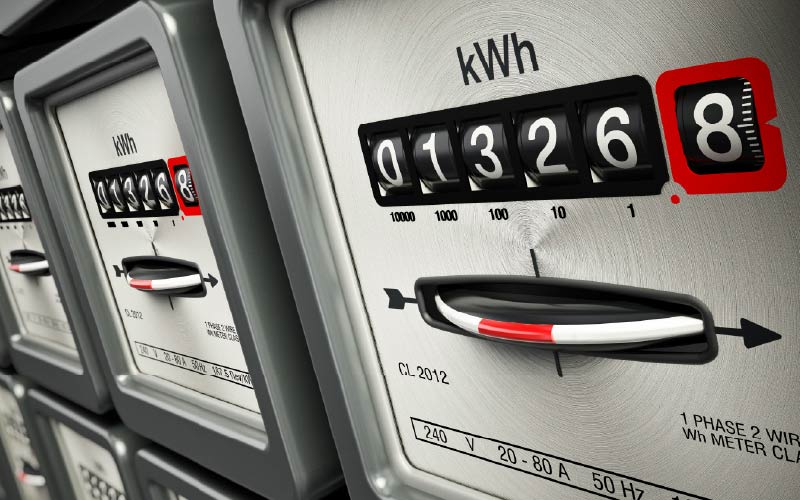Updated: May 20, 2025
Dynamic energy contracts and dynamic electricity pricing management is not new to EU electricity suppliers. According to the Council of European Energy Regulators European Commission, all consumers can save up to 55% on electricity bills thanks to dynamic pricing without significantly changing consumption patterns.
It’s actually a win-win situation for all energy system users, as states Jaap Burger, an expert from the Regulatory Assistance Project:
“By smartly charging their car or smartly controlling their heat pump, users reduce not only their costs, but costs for all energy system users, including those without EVs or heat pumps.”
At MaxBill, we support any type of energy sector contracts, dynamic pricing and tariffs by offering a comprehensive energy contract management system and AI-driven billing and product catalog.
In this article, we invite you to discover everything about dynamic energy contracts. We’ll also talk about implementing flexible pricing models in your organisation.
Without further ado, let’s get started.
Key Takeaways
- In line with the EU directive, end users are entitled to be offered at least one contract that incorporates demand or surge pricing for their electricity usage.
- Under the conditions of operating within a limited range of business plans, a key area where energy providers can stand out from their competitors is how they design their pricing.
- Embracing dynamic price contracts provides retailers with an opportunity to reduce hedging and sourcing costs, leading to greater financial efficiency.
- Dynamic energy contracts deliver pricing agility, rapid responsiveness to evolving customer demands, improved customer satisfaction, refined forecasting and planning processes, foundation for innovative business models.
- The integration of renewable energy sources, often characterized by intermittent availability, is seamlessly facilitated by demand electricity pricing.
- With MaxBill, utility and energy suppliers are enabled to design and implement any pricing model, while ensuring seamless management and accurate billing.
- The contract management module within MaxBill’s CIS facilitates effective relationship management with existing customers, empowering businesses to nurture valuable connections.
- MaxBill new-gen AI billing allows defining even the most intricate pricing logic using plain language inputs like “Apply higher rate after 500 kWh,” and then converts them into precise billing scripts instantly without manual intervention.
- Complex tariffs (including regulatory, seasonal, or customer-segmented) are handled automatically.
- MaxBill AI enables real-time responsiveness, allowing utility providers to adapt pricing structures on the fly.
- MaxBill’s AI ensures every rate and rule is applied precisely across every account, with automated validation that flags anomalies before invoices are sent.
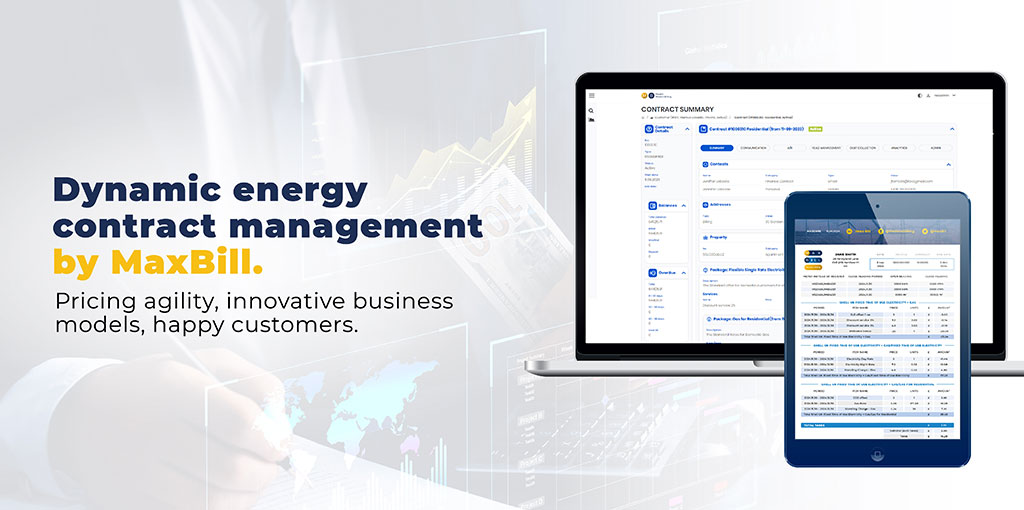
EU dynamic energy regulation greenlights dynamic pricing

With the official green light from the EU directive, demand pricing has emerged as a powerful solution to tackle the intricate challenge of integrating renewable energy sources.
On top of it, the EU directive “Dynamic electricity price contracts” mandates implementing this innovative pricing approach into national law by 2025.
The directive describes dynamic price contracts as “agreements between suppliers and end customers that reflect price variations in spot markets such as day-ahead and intraday markets.”
In line with this directive, end users are now entitled to be offered at least one contract that incorporates demand or surge pricing for their electricity usage.
Moreover, energy companies with more than 200,000 customers are obliged to provide at least one time-based pricing option.
These agreements are specifically designed to introduce a higher degree of flexibility and responsiveness to pricing mechanisms, surpassing the limitations of traditional fixed-price or variable agreements that maintain a monthly price, unaffected by market conditions. Therefore, modern energy billing software is a must to serve such mechanisms.
Types of dynamic energy contracts in the energy and utility services
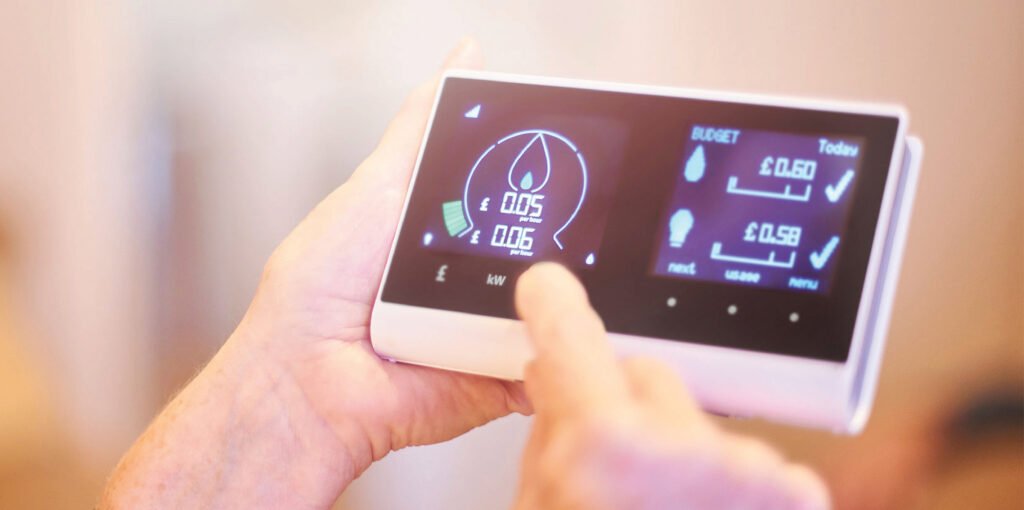
Within the retail energy sector, companies face the common challenge of operating within a limited range of business plans. However, a key area where they can set themselves apart from their competitors is how they design their pricing. The most prevalent dynamic pricing plans can be:
- Time-of-Use Pricing (ToU):
With time-based electricity billing, customers are billed based on the cost per kWh, determined by the specific time of their energy consumption. By dividing the day into predefined periods, such as day and night, on-peak and off-peak, customers have the opportunity to take advantage of the prevailing consumption patterns and unlock potential savings.
- Critical peak pricing (CPP):
At its core, Critical Peak Pricing (CPP) operates as a Time-of-Use (ToU) plan, incorporating an additional top-up rate for select days when electricity prices significantly exceed the average. This innovative approach aims to alleviate load during limited but high-cost hours.
Key components of CPP include the defined time window during the peak price period and the degree of price differentiation between peak and off-peak times. However, in terms of being truly dynamic, there’s still room for improvement.
- Real-time pricing (RTP):
The calculation of customer bills is based on real-time consumption readings captured at least hourly by smart meters. As a result, suppliers operate on a small but fixed margin for every unit of electricity delivered.
Related:
Smart Meter in Europe 2024-2030 to Transform Utilities and Empower Consumers.
Making the terms clear about dynamic energy pricing in contracts
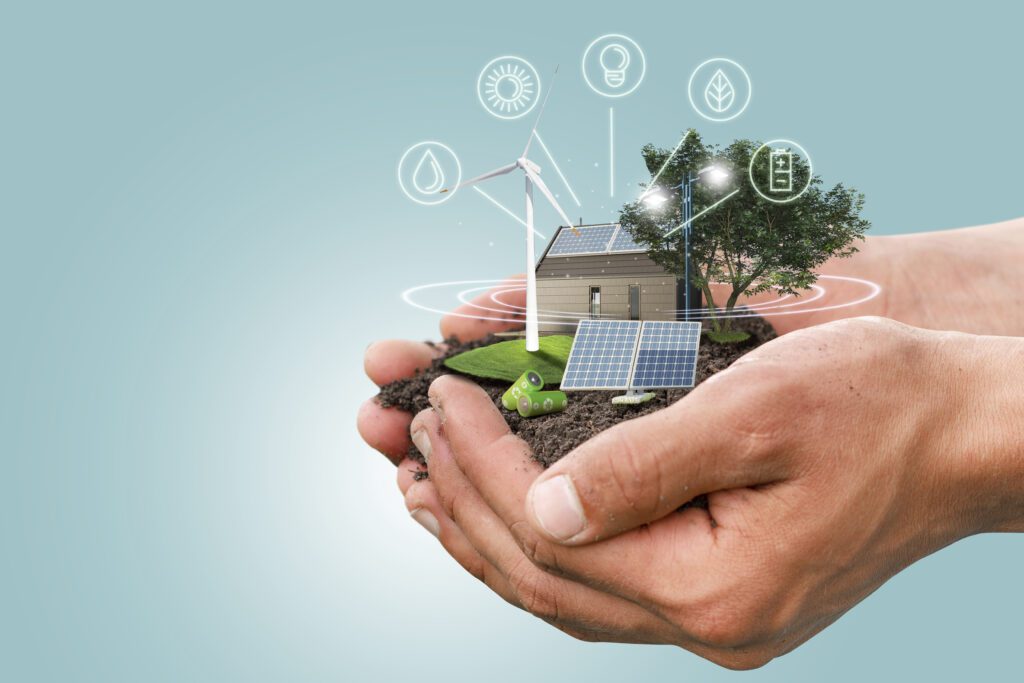
To gain a comprehensive understanding of dynamic contracts and dispel any potential misconceptions, let’s delve into the definitions of key terms. Please review the following explanations:
What is dynamic energy?
It stands as a comprehensive solar solutions supplier, uniting the essential technical prowess and financial proficiency required to conceptualise, fund, construct, and uphold solar energy, energy storage, and electric vehicle (EV) charging initiatives aimed at serving commercial, institutional, and utility clientele.
Consequently, what is an example of dynamic energy?
An example of DE might be any type of energy acquired by dynamic resources, such as sun, wind, hydro, etc.
What is the dynamic energy model?
The term represents a community-driven proposal aimed at adaptively regulating the future energy utilisation of a contract, relying on the contract’s historical energy consumption data.
If a contract excessively consumes resources during a specific cycle, the subsequent cycle will impose a punitive consumption penalty, resulting in higher energy costs for users executing transactions with the same contract.
As the contract utilises resources more judiciously, the energy consumption associated with user interactions will gradually return to standard levels. This mechanism enhances the equitable allocation of energy resources on the blockchain, mitigating the risk of excessive resource concentration within a few select contracts.
What are energy contracts?
In simple words, it’s an agreement between consumers and the organisations that deliver electricity. The latter delivers the system that allows for energy distribution under different conditions, and consumers pay them for the services. In the case of dynamic contracts, such conditions may vary according to the provider’s dynamic energy pricing design.
Related:
Everything about EV Charging Prices Across Europe.
Advantages of dynamic pricing for energy suppliers and end consumers

Demand or time-based energy pricing plays a vital role in shaping consumption behaviour to align with the actual generation of energy. This alignment brings significant advantages to both electricity providers and consumers.
By offering dynamic price signals to consumers, electricity companies incentivise them to utilise power during periods of ample renewable energy, such as sunny or windy hours, thereby reducing strain on the system during peak demand.
This shift has the potential to minimise the need for additional investments in generation, distribution, and associated expenses. In essence, embracing dynamic price contracts provides retailers with an opportunity to reduce hedging and sourcing costs, leading to greater financial efficiency.
The key benefits of dynamic energy contracts for businesses
1. Pricing Agility: Providers are empowered with the flexibility to adjust pricing in response to changes in demand or supply. This ensures competitiveness in the market and enables effective risk management amidst price volatility.
2. Rapid Responsiveness: Electricity providers can promptly adapt delivery schedules, volumes, and energy sources to cater to evolving customer demands. This heightened responsiveness strengthens customer satisfaction and loyalty.
3. Strengthened Customer Relationships: Customers get greater control over their energy usage and costs, fostering stronger relationships between suppliers and consumers. The transparency and flexibility offered by dynamic contracts contribute to improved customer satisfaction and loyalty.
4. Enhanced Forecasting: Leveraging data from these agreements, suppliers can refine their forecasting and planning processes. By analysing usage patterns and trends, they can anticipate demand fluctuations and optimise supply, reducing the risk of over- or under-supply.
5. Competitive Edge: Energy retailers gain a competitive advantage, particularly in markets characterised by price volatility or customers seeking greater control over their energy costs. The ability to provide tailored, dynamic pricing energy solutions sets them apart from competitors with traditional fixed-price agreements.
6. Facilitating Innovative Business Models: Demand pricing opens doors to innovative business models for energy organisations. For instance, demand response programs can be implemented, incentivising customers to curtail energy usage during high-demand periods and enabling suppliers to reward them accordingly.
Dynamic energy contracts bring a host of advantages to end customers, empowering them with flexibility and control over their energy consumption.
Dynamic contracts’ advantages to end customers

Dynamic energy contracts let you pay real-time prices for electricity, so when prices go down, your bill goes down too. In contrast, variable or fixed contracts include a kind of “insurance fee” built into the price, meaning you always pay a little extra just in case prices go up.
A 2023 study in the Netherlands found that households with dynamic contracts saved up to €1127 per year compared to those with variable ones, simply because they avoided that extra fee and used energy smartly when prices were low.
1. Flexibility in Response: Consumers can adapt their consumption patterns in response to sudden energy price spikes. This is particularly valuable for businesses that may be vulnerable to unexpected cost increases. Businesses, in their turn, gain the ability to optimise their energy usage and mitigate the impact of price volatility.
2. Harnessing Price Volatility: Dynamic contracts for energy companies, combined with smart systems, offer consumers the opportunity to leverage price volatility to their advantage. By adjusting their consumption patterns in sync with fluctuating prices, businesses can seize cost-saving opportunities and optimise their energy usage for maximum efficiency.
3. Choice and Control: Surge pricing empowers consumers with greater choice and control over their energy usage. It allows them to make informed decisions about when and how they consume energy, aligning with their specific needs and preferences. This level of control enables consumers to effectively manage their energy bills and unlock potential savings.
The impact of dynamic energy pricing on energy sustainability

Dynamic, also referred to as demand or surge pricing, plays a pivotal role in advancing energy sustainability. Let’s explore how it contributes to a greener future:
1. Real-Time Supply-Demand Alignment: By adjusting energy prices in real-time according to supply and demand dynamics, surge pricing ensures that customers pay a fair price that accurately reflects the current cost of energy. This promotes transparency and incentivizes efficient consumption, fostering a more balanced energy ecosystem.
2. Catalysing Energy Conservation: Dynamic energy pricing acts as a catalyst for energy conservation. Incentivising consumers to reduce their energy usage during periods of high demand or elevated prices it encourages responsible consumption practices.
This collective effort translates into reduced overall energy consumption, minimising strain on existing infrastructure, and alleviating the need for additional energy generation.
3. Enabling Renewable Energy Integration: The integration of renewable energy sources, often characterized by intermittent availability, is seamlessly facilitated by demand electricity pricing.
By adjusting prices based on the availability of renewable energy, suppliers can encourage consumers to utilise green energy when it is most abundant. This optimal utilisation reduces reliance on conventional energy sources, fostering a more sustainable energy mix.
Therefore, dynamic pricing champions energy sustainability by aligning pricing with real-time dynamics, promoting energy conservation, and facilitating the integration of renewable resources.
By embracing this progressive pricing model, the energy sector paves the way for a cleaner, more resilient future for generations to come.
MaxBill’s comprehensive dynamic energy contract management
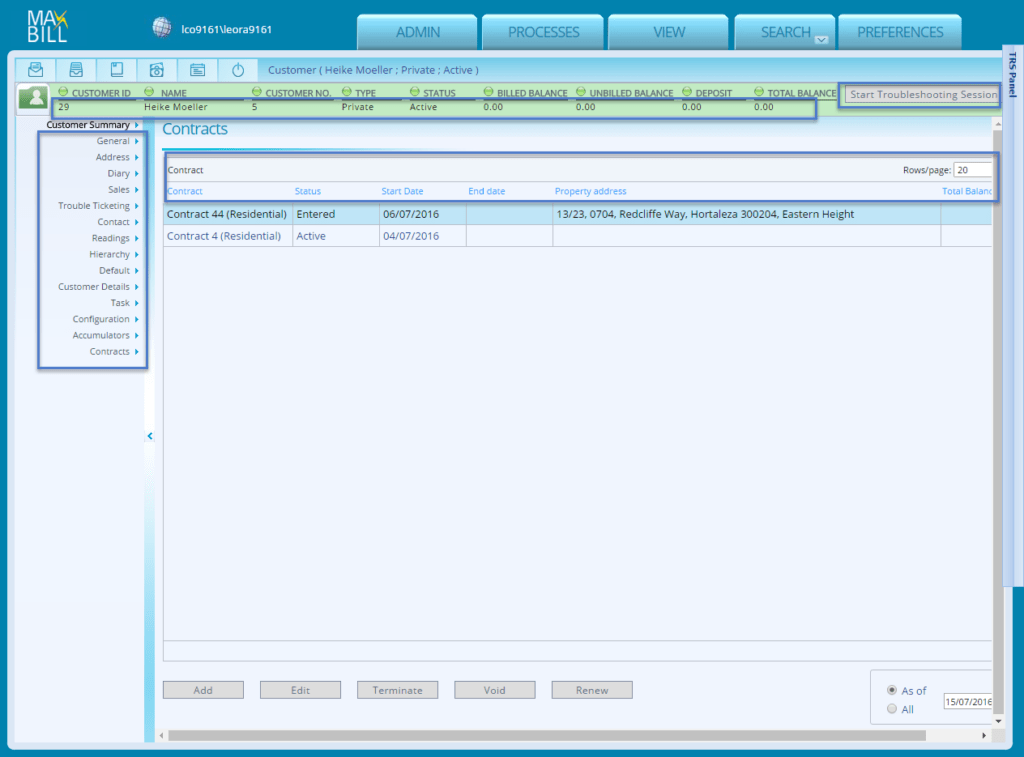
“There is one tool that’s more powerful than regulation, and that’s business models that are attractive to consumers (…) We need to enable businesses to provide compelling services. If we unleash the consumer, we can unleash change much faster than we can imagine. If you get the consumer, you get the investors.”
- Philipp Schröder, Managing Director at Sonnen GmbH
At MaxBill, we believe that new business models are related to offerings that enable customers to achieve sustainable, manageable, and efficient energy consumption.
As the market evolves, the key to success lies in modern solutions that harness the benefits of emerging technologies, such as smart device interconnection, residential and commercial energy management systems, and innovative business models, all geared towards enhancing customer satisfaction.
With MaxBill, utility and energy suppliers are enabled to design and implement any pricing model, while ensuring seamless management and accurate billing. Our configurable workflows, defined frameworks, and automated processes streamline billing operations, enabling rapid introduction and deployment of new products and services.
The contract management solution, seamlessly integrated into our comprehensive CRM platform, facilitates effective relationship management with existing customers, empowering businesses to nurture valuable connections.
MaxBill’s platform, offered as a software-as-a-service (SaaS) energy billing solution, provides holistic capabilities for businesses. By consolidating all essential customer information, including contract details, into a unified digital ecosystem, we empower energy providers with a comprehensive view of their operations.
To sum up, MaxBill enables you to design and implement dynamic energy pricing models with ease, while ensuring accurate billing, effective customer management, and heightened customer satisfaction.
MaxBill AI-driven billing: radically streamlining dynamic electricity pricing and tariffs implementation
If you look at traditional systems in utility companies, updating electricity tariffs, especially tiered, time-of-use, or location-based rates, is time-consuming, error-prone, and often needs developer support.
MaxBill AI billing removes that friction entirely. You can define even the most intricate pricing logic using plain language inputs like “Apply higher rate after 500 kWh,” and the AI converts it into precise billing scripts instantly. There’s no need for manual scripting or long deployment cycles.
Most importantly, complex tariffs (including regulatory, seasonal, or customer-segmented) are handled automatically.
When energy markets shift or new regulations take effect, timing matters. MaxBill AI enables real-time responsiveness, allowing utility providers to adapt pricing structures on the fly. Updates that once took weeks can now go live in minutes, keeping your organisation nimble and always compliant.
Accuracy is just as important. With dynamic pricing, the risk of billing errors increases, and with it, the risk of customer disputes and lost revenue. MaxBill’s AI ensures every rate and rule is applied precisely across every account, with automated validation that flags anomalies before invoices are sent. That means fewer support tickets, faster collections, and more trust from customers.
The business impact coming with it is undeniable. You gain faster compliance, better customer experience, reduced operational overhead, and increased revenue potential. MaxBill makes dynamic energy pricing not only manageable but also scalable and profitable.
Let MaxBill be your trusted ally in driving the success of your energy business in the era of sustainable energy consumption. Get in touch with us right now!

Related:
Innovative and Competitive Pricing Strategies for Energy and Utility.
